the most important Japanese books I read in 2024
plus: some fun end-of-year stats, and a reading prescription just for you!
This year I started to study bibliotherapy— a type of counselling which uses conversations about books to promote well-being— and it’s made me start to think of reading on more axes than just enjoyable→ not enjoyable, but rather to consider the power of the right book at the right time. Not just my favourites; but the ones that felt important! Here’s a reading recap of my 2024, with a few fun stats, and a whistlestop tour of the 12 most impactful books I read this year.
stats and nerdery
This year I read 50 books in Japanese (plus a few dozen manga which aren’t covered here)! This was by far my best reading year, and I’m excited to see if I can beat it next year.
I mostly read on the excellent web-based e-reader ttu, which meant that I could take advantage of tools like yomitan. It’s also convenient reading on my computer because I like to take notes in Obsidian, something I got into in a big way thanks to the recommendation of
. I also got a fair bit of use out of my kindle, though.The length breakdowns are as follows: “short”= under 175 pages, “medium”= 175-275 pages, “long”= 275-425 pages, and “very long”= 425+ pages. I thought that having a goal of books read this year might end up being a perverse incentive to read a lot of very short books, but it turns out this year’s reading has been pretty balanced!
I’m also pretty happy with this balance too. One thing I learnt from talking to readers I met through my bibliotherapy class, is that a lot of people seem to REALLY hate self-help books; but I actually kind of love them, and I read some fun ones in Japanese this year! I think the best way to get good advice is to expose yourself to lots of advice, even if you don’t agree with everything the author says.
Star rankings! I read 9 books this year I would class as absolute masterpieces, which is a pretty great percentage. There were also a few I did not vibe with at all (but only one that was offensively bad enough that I dropped, and isn’t represented in these stats). I think part of that was expectations; a few books I rated one star this year were either very highly hyped up on social media, like 誰が勇者を殺したか, or had won awards, like 何者. Conversely, most of the books I rated 5 stars were total surprises. Next year I’m going to follow my gut more in hope of finding more of those nice surprises.
monthly reading highlights
january: おやすみなさい、また明日
I started off the year with this readalong with the 別次元の図書館 bookclub. I knew the author from 美しい彼, which I loved, but didn’t know what else to expect. おやすみなさい、また明日 is a story about rebuilding a life worth living after a devastating breakup. But it’s also about a million little mundane tragedies and how to keep persevering anyway. And it’s about the act of writing itself, and about stories, and how they change people’s lives.
I've never cried at a novel as hard as I did with this one. When I finished the last page, I choked back gulping sobs until I succumbed to it entirely, and let tears cloud my glasses and sat there and snivelled until there was nothing left.
On a personal level, this book made me realise that I had been obsessed with my own tragedy, lingering in it, wallowing in it, instead of taking proactive steps to live the kind of life I wanted. It was easy for me to see Tsugumi and berate him for not asking for what he needed to not be unhappy, for not reaching out and grabbing his chances, but I was doing the same thing myself.
february: 全力で生きる技術
A motivational book by my favourite pro wrestler Hiroshi Tanahashi, and it came at exactly the right time, off the back of my underwhelming N1 results. This book helped me drag myself back up after that failure; and with his characteristically warm and avuncular tone, Tanahashi imparted some important lessons that I’ve kept in my heart this year:
The great pleasure of life is the comeback. If we never faced opposition or failure in our lives, we wouldn’t get the delicious opportunity to turn things around.
There are no wasted experiences in life. Just by the act of trying, you’ve learnt something, and even defeats and mistakes may prove to be useful experiences to future you.
Trying hard is cool! It’s tempting to want to not try our best, because of fear of the embarrassment of failure. If we don’t try, when we fail, we can say “well I didn’t try, so it’s okay”. But instead, Tanahashi encourages you to live life at full power: if something is worth doing, it’s worth trying hard.
march: 甘くて切ない
One of the aforementioned lovely surprises of the year, this is a book I bought entirely for the cover. Ritsu thinks he’s fairly content with his life; with his job at the mall opticians; with eating his packed lunch in the food court every day— apart from the lingering shadow of his difficult relationship with his mother sometimes looming over him. But when a familiar-looking visitor turns up at the opticians one day, he becomes involved in a friendship that leads him to re-examine a lot of things about himself that he thought he had buried forever.
This book handles the theme of 親孝行 (filial piety) very delicately and thoughtfully, and it had me thinking about my own family, about bonds of love and bonds of obligation. What do we owe to our mothers for bringing us up? What do we owe to our younger siblings? How can one be a “good son”(or daughter)? If you have ever had a complicated family relationship, you might find this book healing to some degree.
april: Atomic Habits
This is a funny one, because I actually read it in English before the pandemic, but reading it 5 years later in a different language gave it an entirely different flavour, and I took different things from it. I was also doing a studying sprint at the time (shout out to my Accountability April crew!) and it felt like very poignant timing.
To be honest, some of this book I disagreed with, as I’ve documented before, but it’s earned its spot as an important book, because all through the year I’ve kept coming back to one concept that it explores. It’s been useful over and over again, as I’ve re-evaluated my goals, faced setbacks, and explored roadblocks to my own success.
That is the idea of "identity". James Clear talks extensively about the role that identity plays in habit-forming, and it made me realise the identities I was holding on to that weren't serving me any more. Like most self-help books, I would recommend taking what feels useful to you from it, and discarding the rest.
may: DEADLOCK
My absolute favourite book I read this year.
DEA Agent Yuuto has been convicted of a crime he didn’t commit: and to make things worse, it’s the murder of his beloved longtime police partner. Now he has to navigate the choppy waters of California maximum security prison, where he finds himself both facing terrifying violence, and forming unlikely alliances.
This is an excellent book just from an entertainment standpoint: the pace is breakneck and it reads like an American TV drama in novel format. But it’s also very intelligently written, and tackles themes like racial segregation, class solidarity, and the USA for-profit prison industrial complex. I found Yuuto’s stoicism and strength in the face of seemingly impossible circumstance so inspiring. And if you’ve ever had your personhood stripped from you; ever had your freedom— whether literal or psychological— seized from you, , you might find him inspiring too.
The story totally gripped me, and effortlessly pulled me into its realistically gritty world. Would recommend wholeheartedly (with the caveat of a trigger warning of sexual violence).
june: FLESH&BLOOD
They say books can take you places, but this book inspired me to literally go on a journey to retrace the steps of its protagonist. FLESH&BLOOD was a series I tried to start the previous year, but had to shelve for being too hard at the time. I was so pleased to finally defeat the first volume, and found myself completely sucked into the world and utterly compelled by its characters. I’ve already written a lot about this one in the post linked above, so I’ll leave it there, but this was another of my 5 star reads in 2024.
july: 十角館の殺人
A classic mystery novel about a bunch of detective fiction-enthusiast university students on an isolated island. This ended up being important in a really convoluted way. I knew that this book was inspired by the Agatha Christie novel And Then There Were None (initially released under a much more unsavoury name), which meant that when my mum spotted a poster for a stageplay production of the same, we grabbed the opportunity to go see that together. Then later in the year, I started playing the mystery visual novel 大穢 (Ooe), also inspired by And Then There Were None, which I would never have known about if it weren't for 十角館, and that meant I could enjoy the references and the different approach after seeing a different Japanese interpretation of the closed-room murder format. Additionally, later in the year, I was able to recommend 十角館 to an Agatha Christie fan I met via bibliotherapy. It felt like this book ended up being in the centre of a bunch of things aligning.
The book itself: it dragged a bit! The end was satisfying, and the mystery-nerdery enjoyable, but the setup was quite interminable, and the gender roles were jarringly outdated.
august: 愛がしたたる一皿を
If nothing else, this book is important because it inspired me to start this blog!
september : 愛を与える獣達 3
This month I started taking a course in bibliotherapy skills. In its formal manifestation as a therapy it's in its infancy— the course I did was the first of its kind in the world. But in a broader sense, the healing power of books has been acknowledged for as long as books have been around. Thinking about the therapeutic benefits of “book prescriptions” made a lot of things I had half suspected click for me, and I started to view my own year’s reading through a different lens.
So in September I finished the third volume of the 愛を与える獣達 series.
was the one who initially invited me to read it with them, back in September 2022, and it was such a wonderful surprise. It was my first time reading a webnovel (although I've now switched to the published volumes) and it felt like it was suddenly really clicking to me how exciting it was being able to read Japanese; how many doors were opening to incredible stories. It's a series about a mild-mannered Japanese doctor who finds himself in a land of enormous beast-eared men, and the unexpected tribulations and joys that ensue. The series doesn't lack drama or violence, but it is at its core immensely comforting, and I felt that keenly as I finished volume three.october: オオカミパパに溺愛されています
This was the book I took with me on my Francis Drake Minibreak, my solo holiday for my birthday. It’s a very fluffy romance that was perfect for a holiday read, and one of my favourite reading memories of the year is of devouring a chapter of this in an indulgent mid-afternoon hotel bath.
november: その悩み、大胸筋で受けとめる
Another Tanahashi book! This is a compilation of his advice column from a Japanese women's magazine, and covers topics of anguish as diverse as terminal illness diagnosis, marriage regret, and a friend who smells bad. Tanahashi really has solid, empathetic advice on a range of subjects, and as a similar demographic to the 30-somethings writing in, I felt particularly seen when he advised women who felt behind in life.
I finished this book merely hours before I headed out to my bibliotherapy practical, where I used the skills I'd learnt from my course with members of the public for the first time. In the afterword, Tanahashi gives some perspective on how he answered the questions in this book (the quote in the picture above). Roughly, “I don’t tell people ‘do this’, but rather try to answer by saying ‘how would it feel if you did this?’, and give them a gentle push on the back.” I decided to carry this energy with me to the bibliotherapy event, and it was (I think!) an enormous success.
december: SPY×FAMILY 家族の肖像
I read this whole book during our very first 24-hour readathon over in the bookclub. Despite being deep in the throes of covid, I had so much fun at this event, and loved the feeling of connection with other readers around the world. The novel was a perfect pick, divided into four mini-stories, very funny and moreish. It felt just like watching the anime in novel format. The audiobook was also excellent! The readathon is already such a special memory, and I want to host more in 2025! Below is a graphic of everything that our members read during the event.
book prescriptions
Thank you for reading this far! I hope your 2024 was full of wonderful books, and that there are many ahead in your new year too.
In the spirit of bibliotherapy, I'd like to end this post with a handful of book "prescriptions". I've already discussed most of these books above, but here they are framed in a way that you can pick a recommendation for yourself based on what you need right now. I hope they can be useful!
💊 For when you need to find resilience and perseverance after you've been treated cruelly and unfairly: DEADLOCK by 英田 サキ
💊 For when you want to pick yourself back up on your feet after a setback, and to face new challenges with a fresh perspective: 全力で生きる技術 by 棚橋 弘至
💊 For when your family members are taking more than you have to offer: 甘くて切ない by 月村 奎
💊 For when your actions are out of step with your intentions: Atomic Habits by James Clear
💊 For when you feel like a traveller in an alien land: FLESH & BLOOD by 松岡 なつき
💊 For when you've been going too hard, and you need permission to be kinder to yourself: 「誰かのため」に生きすぎない by 藤野 智哉
Happy new year and here's to a 2025 full of lots more reading!




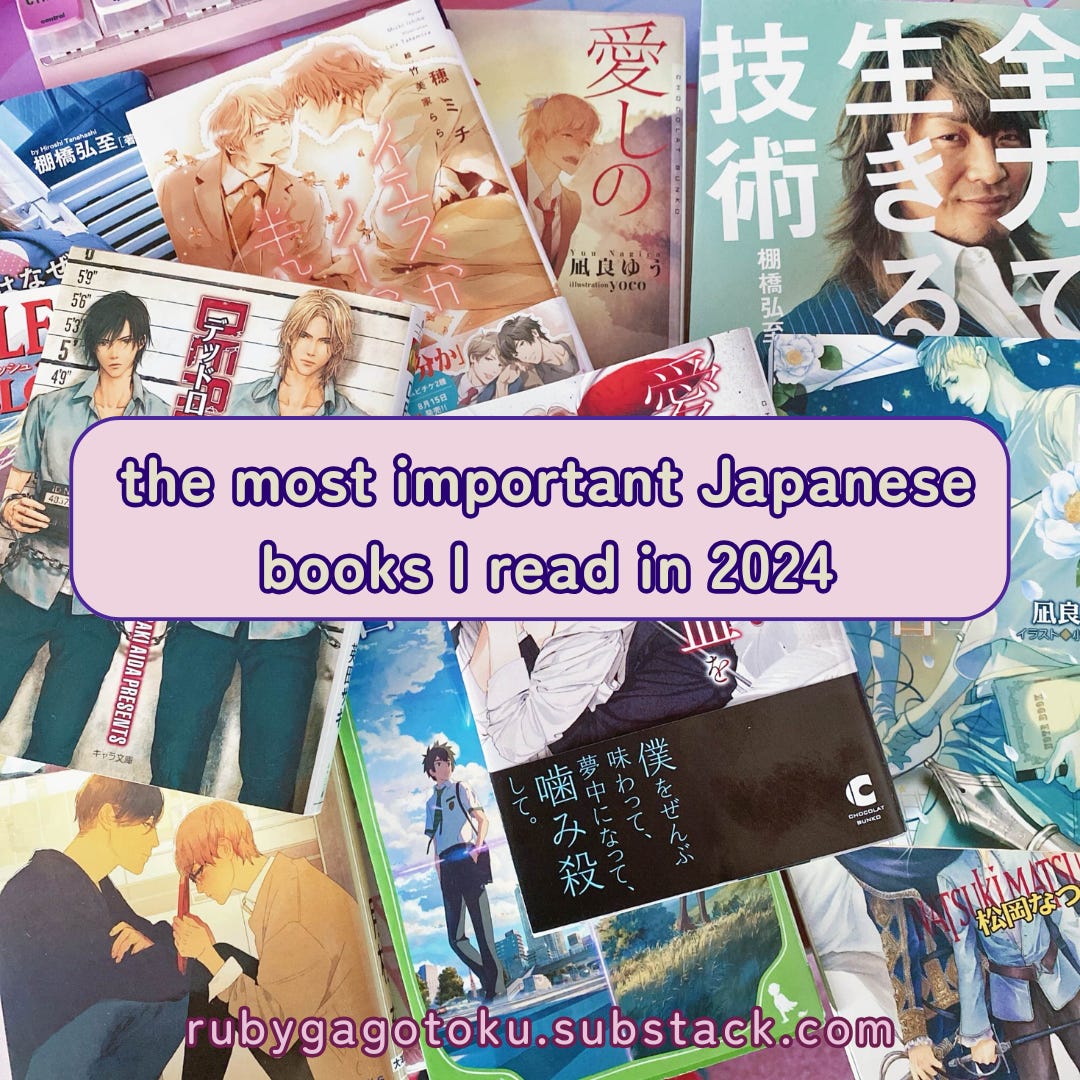
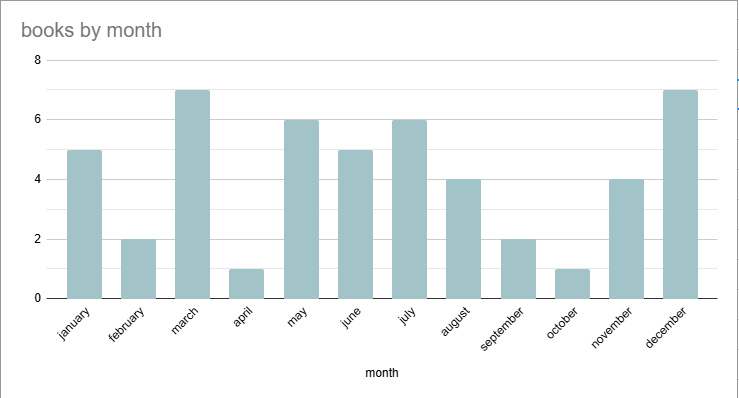




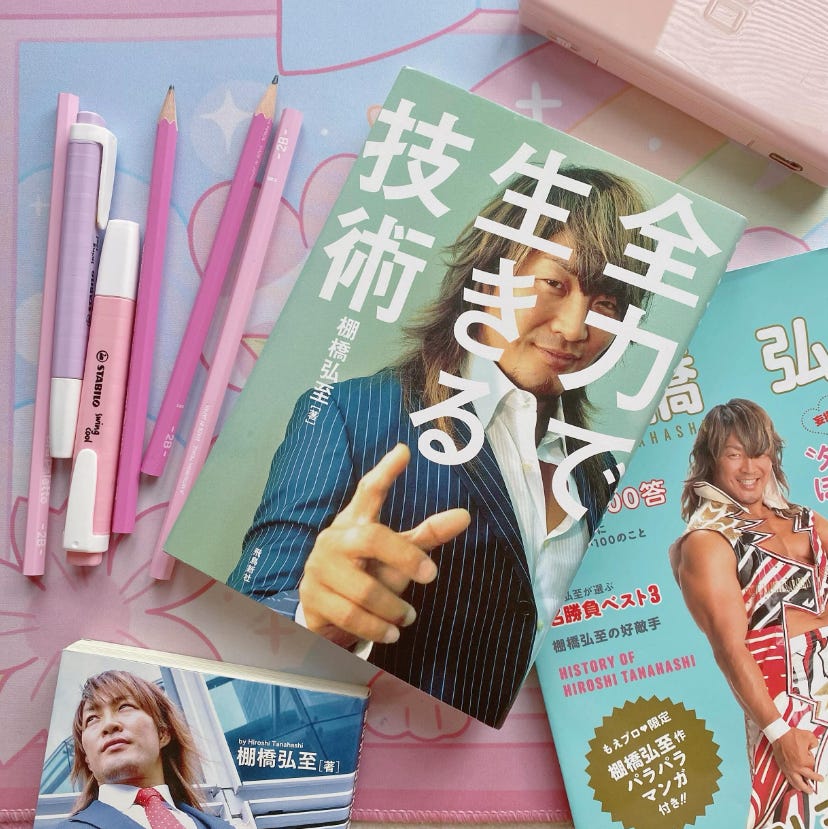
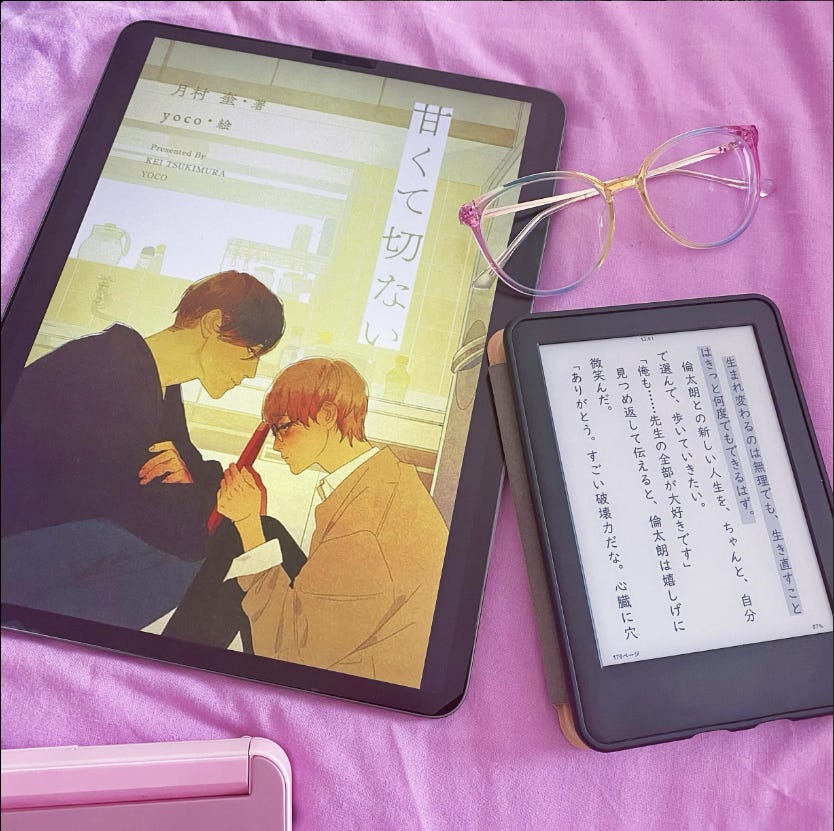


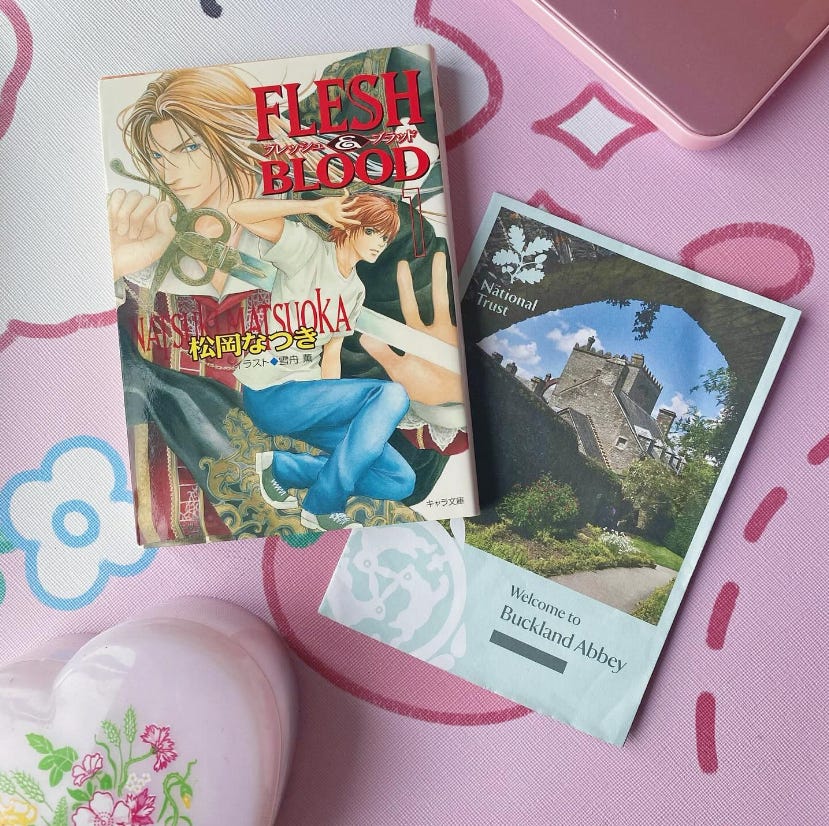


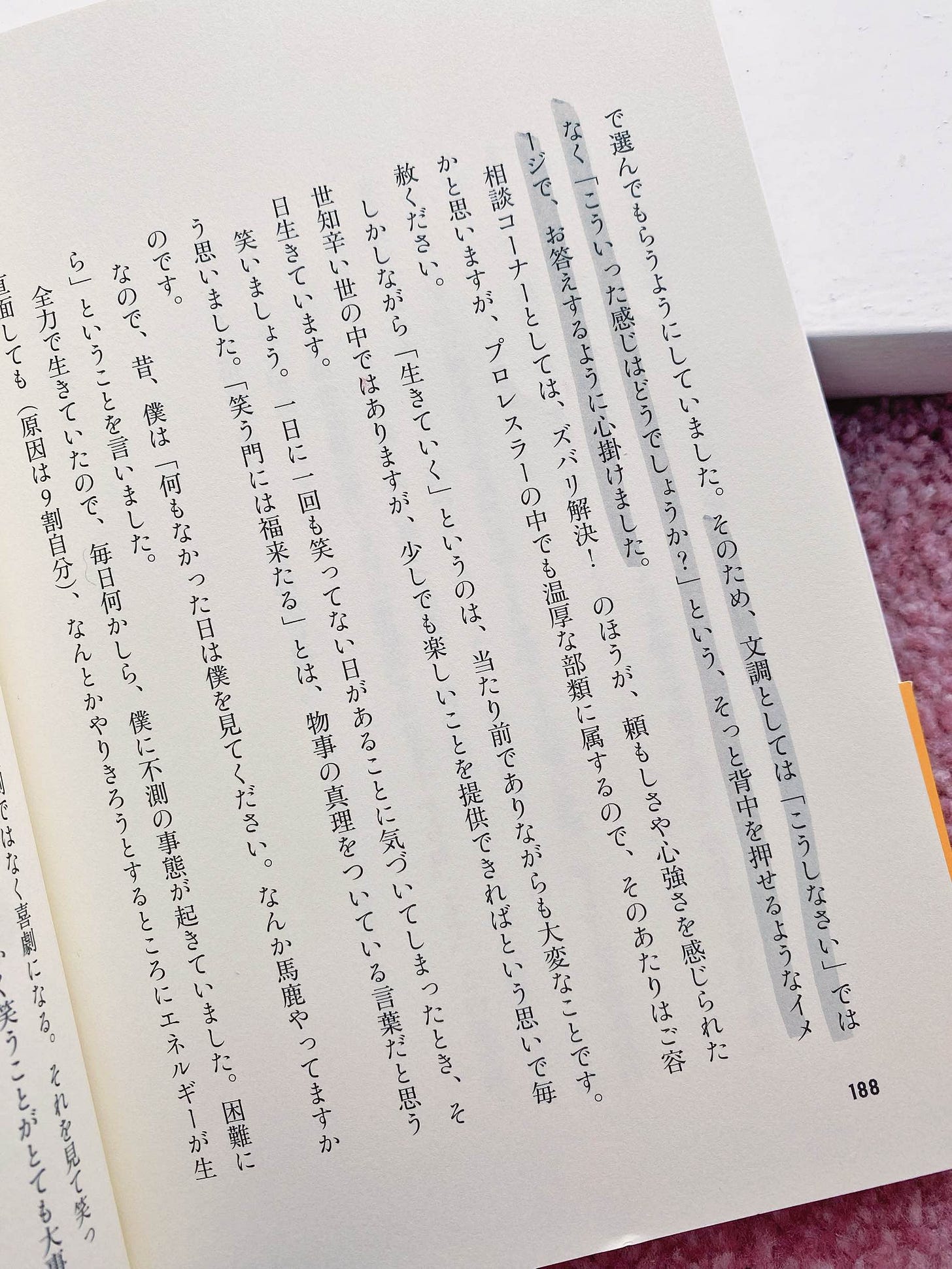

Love this! I tend to read books and not finish them so I never know how to track them. I may try to be a bit more consistent next year with my tracking
Loved the prescriptions!! Hope you have an even better reading year ahead 🥰